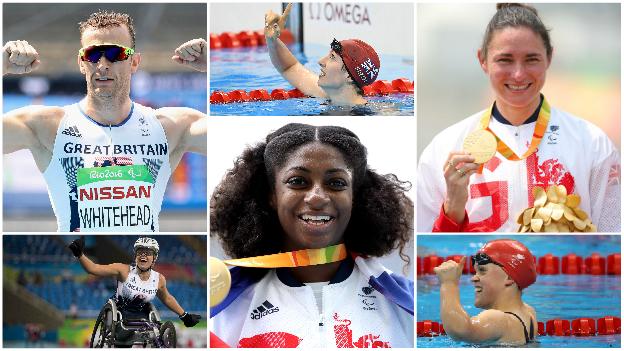Sir Philip Craven: Outgoing IPC chief on 16 years at the top of Paralympic sport
- Published
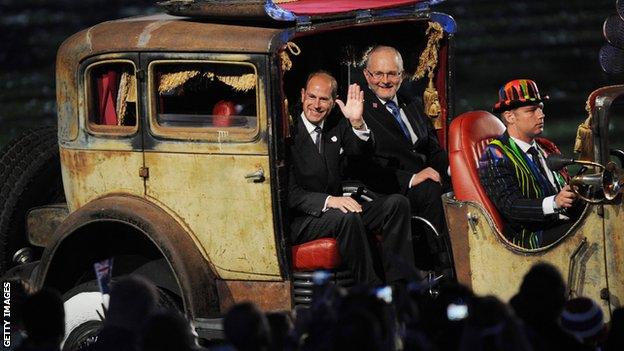
Sir Philip Craven (centre) arrives alongside Prince Edward for the closing ceremony of the 2012 London Paralympic Games
The Paralympic Games are unrecognisable from when Sir Philip Craven took control of them in 2001.
During his time in charge, the International Paralympic Committee (IPC) has progressed from a relatively small disability sports body to one of the most highly respected sports organisations in the world.
The Paralympics are now the world's third biggest sporting event, beaten only by the Olympics and World Cup in terms of global ticket sales.
In his 16 years in charge of the IPC, Craven - a five-time Paralympic wheelchair basketball player - has been driven by the mantra of "enabling Paralympic athletes to achieve excellence and inspire the world".
With 38 more nations competing at Rio 2016 compared to Sydney 2000, and TV audiences swelling from about 300 million to over 4.1 billion during the same timeframe, it could be considered 'mission accomplished'.
But Paralympic sport has not been without its challenges.
From the imprisonment of the movement's biggest star - Oscar Pistorius, to state-sponsored Russian doping, to the Paralympics that nearly did not happen, to the ongoing concerns about classification abuse, it has been a far from simple path to navigate.
Before the appointment of his successor on Friday, Craven explains to BBC Sport how he helped transform the Paralympics.
He also assesses some of the challenges facing the next IPC president Andrew Parsons, who secured 84 votes out of 162 on Friday.
How the Olympics helped the Paralympics
"The Paralympic Games would not have grown into the event it is today without the 'two Games, one city' model," says Craven of the agreement signed with the International Olympic Committee (IOC) in 2000.
The Paralympics were born out of the IWAS World Games, which were created in the late 1940s for servicemen injured during World War Two.
The first Paralympics took place in Rome shortly after the 1960 Olympics. Tokyo also held both events four years later, but it took until 1988 for Summer Games and 1992 for Winter Games to be consistently held in the same city.
That only became the rule, though, in the early part of this century - a move driven by experiences at Sydney 2000.
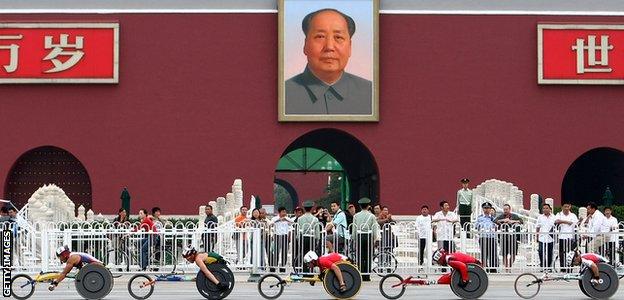
More athletes and countries than ever before competed at the Beijing 2008 Paralympics, with a total of 20 sport on the programme
As the IOC basked in the glory of what then president Jacques Rogge claimed were the "greatest ever" Olympics, the subsequent Paralympic experience was markedly different.
"It felt like the Australians really weren't that keen [on the Paralympics]," Baroness Grey-Thompson, who won four gold medals at the Games, tells BBC Sport.
Craven recognised immediately that changes were essential, and his lobbying of the IOC ensured that from Beijing 2008 onwards the needs of the Paralympic movement - in terms of facilities, accessibility and event promotion - were met in full.
"From that agreement flowed the Games in Beijing, which showed the world we had a space rocket ready to explode," said Craven.
The bidding process for the 2012 Games would be the first time potential host cities had to integrate Paralympic plans into their pitch.
"That rocket went to amazing altitudes and planets at London 2012," he says with a smile, before referring to Jonnie Peacock's 'hushing' of the crowd before the 100m final as his favourite memory from the past 16 years.
"The impact those Paralympics had on the UK and other parts of the world was incredible."
Does Paralympic sport struggle financially?
Craven became paralysed from the chest down after a climbing accident when he was 16, but is loath to use the word 'disability', external - "the d-word", as he refers to it - when asked about the impact of impairments on his life or that of other Paralympic athletes.
He is passionate and resolute, insisting: "It's the way I am and, sure, it may take me longer to do some things than other people but I find a way."
It is this steely focus and determination which helped turn around the struggling organisation when he came to power.
"When I arrived, we didn't even have one sponsor," says the 67-year-old.
Sixteen years later, the movement is backed by some of the biggest companies on the planet, with Visa, Toyota, Samsung, BP and Allianz among its major partners.
One of Craven's key negotiations with the IOC came in 2003, when he ensured the IPC would receive a cut of the broadcasting and marketing revenue generated by the organising committees for each Games.
That - in addition to new commercial deals - has helped the organisation's revenue swell from about £5m in 2011 to almost £18m in 2016.
In short, it has greater financial resources than ever before, but as a non-profit organisation it faced disaster in July last year, when Rio 2016 organisers delivered the news the IPC had been dreading.
"It was less than eight weeks before the Paralympic opening ceremony and their CEO phoned me to say, 'there's no money left'," recalls Craven.
The Games that nearly did not happen
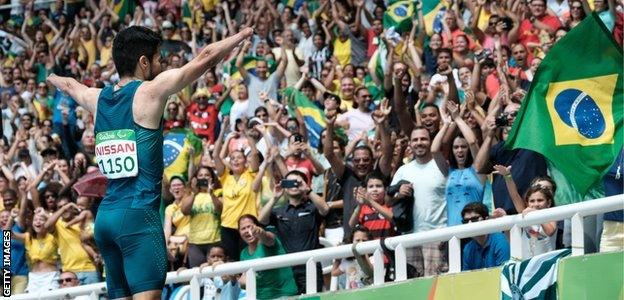
Despite the challenges Rio faced in the build-up, the Games were the second-most attended Paralympics behind London 2012
Craven admits the Rio Paralympics "came close" to not taking place, and describes the time - which also saw him pass out from exhaustion due to stress - as the "most challenging circumstances" in the organisation's history.
"What I'm most proud of is Rio," admits Craven.
He says IPC vice-president Andrew Parsons "found the money", CEO Xavier Gonzalez helped "reshape a scaled-down Games to work within the revised budget", and Craven looked after the rest.
Such was the turmoil in Brazil at the time - with the president impeached and the country suffering severe financial austerity - even once additional funding had been agreed with the interim government, an injunction halted its release.
"We just had to believe in our principles and keep telling ourselves that we'd never let the Games not happen," said Craven.
Does Russia have a Paralympic future?
On the same day Craven received that phone call from the Rio 2016 organisers, Dr Richard McLaren released the first of his reports alleging the presence of state-sponsored-doping in Russia.
IOC president Thomas Bach was widely criticised for what many viewed as a weak decision to leave individual international governing bodies with the responsibility of deciding whether Russian athletes could compete in their respective sports at Rio 2016.
Russian para-athletes banned after doping scandal
The IPC, in contrast, was highly commended for banning the nation in its entirety from the Paralympics. Craven insists the decision "wasn't courageous, just correct".
"If we hadn't made that call then the future of our movement and what it stands for would've been in jeopardy," he told BBC Sport.
Following an announcement on Wednesday, the IPC will allow Russian athletes to compete as neutrals in qualification events for the 2018 PyeongChang Winter Paralympics.
However, there is no guarantee the suspension will be lifted for the Games themselves, with that ban set to be reviewed in November.
Should it remain, Craven insists a decision about whether select Russian athletes could compete as neutral competitors at the Games is "one for the new IPC president and board".
Is classification the biggest Paralympic problem?
Rio Paralympics 2016: Categories of impairment explained
Many of the recent Paralympic Games have gone ahead after last-minute controversy regarding athlete classifications.
Classification is the process by which an athlete is selected for a category featuring other competitors who have similar impairments or conditions which similarly impact their ability to perform their sport.
It is the "very reason" Craven, a world champion in 1973, became involved in sports governance.
"The classification in wheelchair basketball was all wrong and we couldn't get a new one accepted in the 1970s so I came in and blasted it through," he said.
Para-swimming had the highest-profile cases before London 2012, with USA's Mallory Weggemann - who had been predicted to challenge for seven gold medals - put into a 'harder' category with those who had less severe impairments. She came away with one gold.
Meanwhile, Ellie Simmonds' American rival Victoria Arlen was initially deemed ineligible for the event, before being reinstated.
To avoid this last-minute mayhem, testing is now much more rigorous and frequent, however greater thoroughness has revealed how the system has been open to abuse.
Some coaches are believed to have put athletes through intense workouts just before being assessed - so they appear to have greater impairments - whilst it has been suggested there are athletes who have exaggerated the extent of their disability.
To minimise this form of cheating, in 2015 the IPC introduced new rules to allow retrospective punishments for 'intentional misrepresentation'.
Craven, who sees classification issues as a bigger problem than doping in Paralympic sport, admits this is "one of the biggest areas" for his successor to "continuing investigating".
How can Paralympic sport boost crowd numbers?
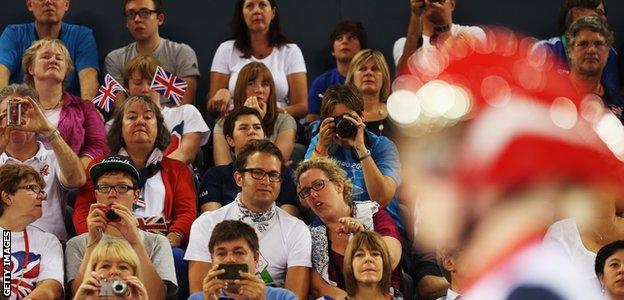
The London 2012 Paralympics sold 2.8 million tickets
While Sydney 2000 officially registered ticket sales of 1.2 million, many of these were actually given out for free, and about 850,00 were purchased during Athens 2004.
That figure soared to 1.8 million for Beijing 2008 but that in turn was surpassed by a record 2.8 million at London 2012, before Rio 2016 brought in about 2.2 million.
Craven refers to the spectator numbers for the Summer Games as "quite amazing", though sports struggle to attract big crowds to their individual World Championships.
The World Para-athletics Championships in London this summer were a notable exception - selling more tickets than the seven previous editions combined.
Craven emphasises "progress is being made" but adds he would like to see more sports working together - as is happening later this month, with the World Para-swimming and World Powerlifting events held simultaneously as a 'festival of sport' in Mexico.
However, Baroness Grey-Thompson views things differently.
"I would like to see more integration with mainstream [able-bodied] sport and disability sport," she tells BBC Sport.
"I understand with athletics the two events are too big on their own to combine, but for perhaps judo and taekwondo it could have a really positive benefit and bring Para-sport to a new audience."
Paralympians 'deserve' greater recognition
Weir wins final track race
The number of competitors and countries taking part in the Paralympic Games has gradually increased during Craven's reign, and he says that must continue after he leaves.
He has been instrumental in the formation and implementation of the Agitos Foundation,, external which aims to help unearth new talent in regions and communities around the world who have traditionally been unable to access facilities.
"This is one of the things I'm most passionate about because it has the potential to do so much," he says.
"It's breaking down barriers and engaging a diverse group of people in a way that nothing else can."
Craven would also like to see greater recognition for the achievements of current Paralympic athletes.
Olympic greats Sir Chris Hoy, Sir Bradley Wiggins and Sir Steve Redgrave have all been knighted for their respective multi-gold-medal-winning feats. David Weir was made a CBE for his six career Paralympic titles.
"I hate hearing that it's easier to win a Paralympic medal than an Olympic medal," says Craven. "It's not. If you look at what Weir achieved and who he was up against in those races it was incredible."
A long-term target for the Paralympic movement will be to 'crack America', which has been criticised for a lack of disability sport coverage in recent years.
The awarding of the 2028 Games to Los Angeles offers huge potential.
"There's never been a population on earth that's so well informed about Paralympic sports, so we're making strides there and LA is a great opportunity for further growth," says Craven.
What is Craven's legacy?
Baroness Grey-Thompson says Craven has "overseen the greatest period of transformation in the history of the Paralympic movement".
Miguel Sagarra, a former IPC vice-president, believes Craven leaves leaves the IPC in "outstanding shape - as a strong sport organisation that behaves live a business, not a business that has sport as a product".
And Xavier Gonzalez, the IPC's CEO, says: "He has had an amazing ability to open doors for the IPC, creating opportunities for further growth. He's taken the IOC relationship to the next level with it becoming more of a partnership."
Reflecting on his 16 years in office, Craven insists his passion to drive forward the Paralympic movement was actually "never about getting the athletes the respect they deserve".
"We needed to create a stage for them, which would enable them to earn it for themselves," he says.
"Hopefully I've played a part in that and I look back on my time with a lot of pride."
- Published6 September 2017
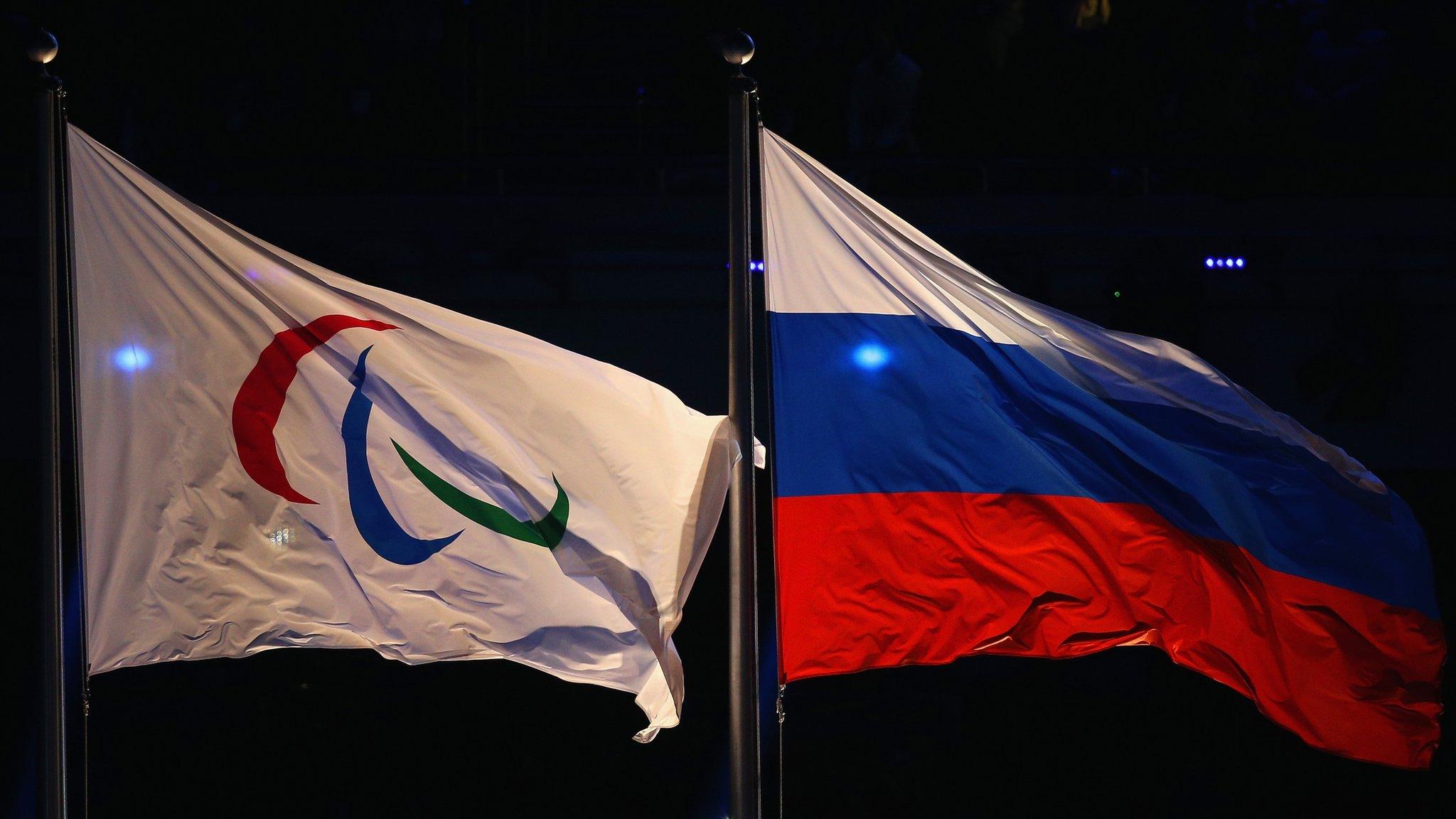
- Published4 September 2017
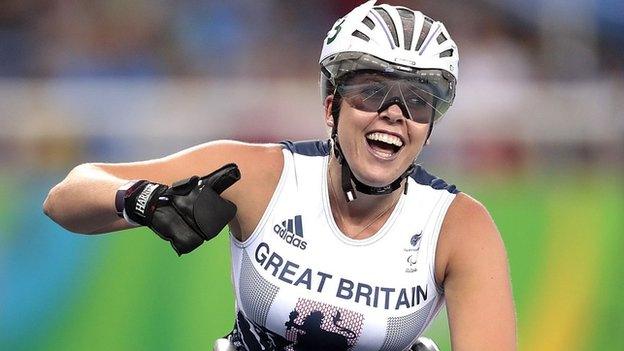
- Published29 June 2017
- Published17 September 2016
